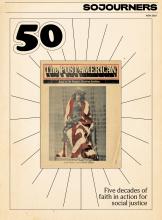FOR 12 YEARS, the Hortons have spent their summers on the revival circuit, driving hundreds of miles from one small city to another. Samuel Horton, a Black Baptist preacher famous for his healing, is proud of the souls he has won for the Lord and prouder of the power he wields. Still, he yearns for miracles no one would question, that would wipe away any doubt in his ability. If only he could heal his younger daughter, Hannah, who has cerebral palsy. If only his wife could give him another son, especially after their second son, Isaiah, was stillborn. In his pride, Samuel blames the women around him for his own limitations, even as he relies on them to hold together the picture of faith he has carefully constructed.
Behind the scenes of Samuel’s performance is 15-year-old Miriam Horton, the narrator of Monica West’s Revival Season. When the novel opens, Miriam is in awe of her father’s position and power, despite questioning the limited roles women hold in her community. As she helps raise Hannah and supports her mother, she memorizes her father’s prayers and sermons, carefully stud-ying his process. She particularly envies her younger brother Caleb, who has the privilege of shadowing their father. Still, she prays that the scandal of the previous summer—when her father injured a pregnant girl he was meant to heal—does not follow them into the new season.
Read the Full Article

